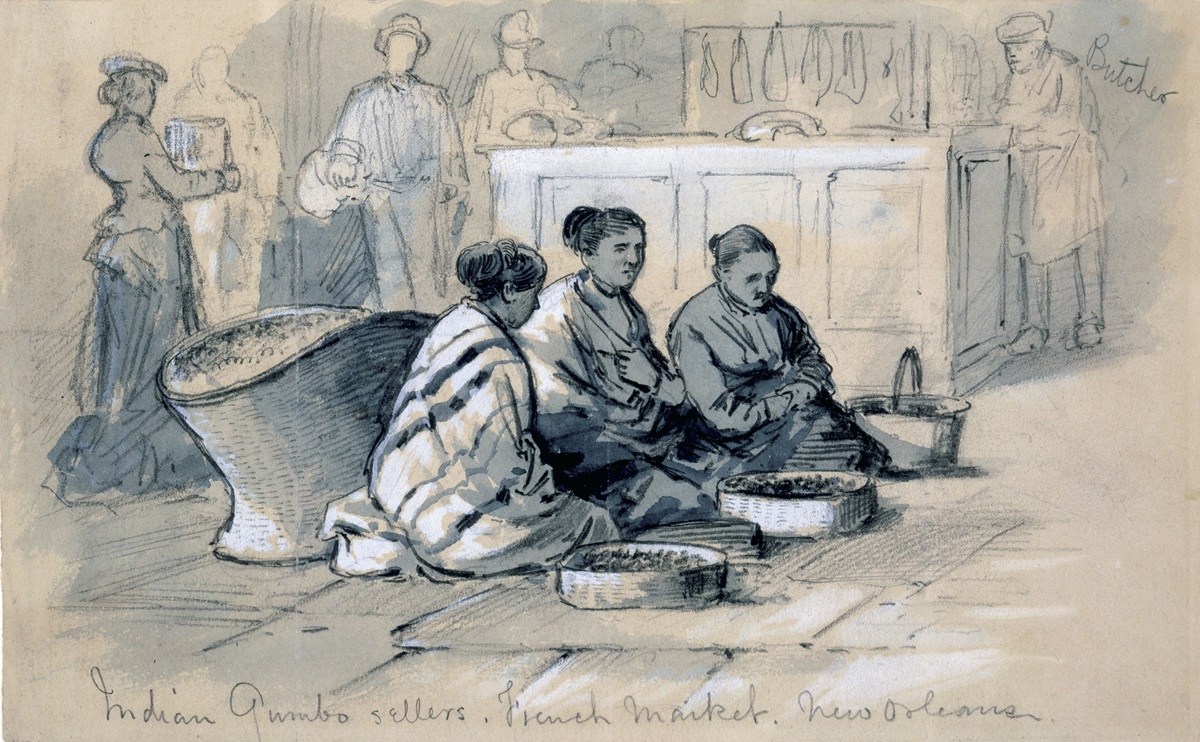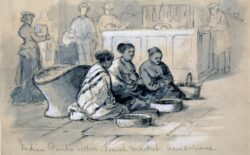Choctaw Gumbo
The dish owes many debts to Native cooks—but not its name
Published: November 30, 2023
Last Updated: February 29, 2024

Gift of Mr. and Mrs. Albert Louis Lieutaud, The Historic New Orleans Collection
Frank Hamilton Taylor, Indian Gumbo Sellers. French Market. New Orleans, ca. 1870. Pencil and wash on paper.
Well, kombo is a Choctaw word. Now. Just like “gumbo” is a word in English, now. But these are both borrowings from Central African languages in the Bantu family.
I’d like to start with a caveat: I am a passionate advocate for increased recognition of Native American contributions to local, national, and international culture. In my mind, the French Market should be called the Houma Market, and the former Place d’Armes renamed Bulbancha Square. I’m convinced of Choctaw origins for the word “okay” (as is the Oxford English Dictionary), as well as the phrase “jockamo feena” (from achukma fehna, meaning “very good”). But while there has been Native influence on the dish that is now called “gumbo” since it’s been cooked in Louisiana, there isn’t much evidence to support a Choctaw origin of the name, as much as I might like there to be.
Let’s look at that evidence.
The claims of a Choctaw etymology point to the term kombo, referring to ground sassafras leaves (filé); in his 1909 monograph The Choctaw of Bayou Lacomb, anthropologist David Bushnell records it as kombo ashish, with a(k)shish meaning “root or nerve.” And although it seems strange that Bushnell refers to ground leaves as a root, Scierra LeGarde, a member of the Bayou Lacombe Choctaw community, interprets this in a more metaphorical way: a gumbo is not a gumbo without sassafras, essentially making it “gumbo’s root.”
And that’s about it. Earlier dictionaries of the Choctaw language, including by the missionary Cyrus Byington, and by Allen Wright (the nineteenth-century Choctaw chief who suggested the name “Oklahoma” for the future state) leave out the term kombo entirely. Instead, the term kvfi (Oklahoma Choctaw spelling, pronounced “cuffee”) is listed as the word for “sassafras.” In fact, elsewhere in Bushnell’s same monograph, he lists the term kafe ashish (his spelling) as the term the Bayou Lacombe Choctaw use to refer to the sassafras root.
To my knowledge, this is the first written instance of the term kombo being used to refer to ground sassafras leaves in the Choctaw language, suggesting that this word may be a borrowing from another language. Of course, there is the famous nineteenth-century image of the Choctaw “gumbo sellers” in the French Market with baskets full of what are likely sassafras leaves, but let’s not forget that rebranding items to make them more recognizable and attractive to potential buyers is a common marketing strategy. After all, Café du Monde located nearby, in the same building, was replacing coffee with ground chicory root and calling it café au lait—not chicorée au lait. (Interestingly, the word kvfi is also commonly used to refer to “coffee” today, at least in Oklahoma).
What if, then, prior to contact with Europeans and Africans, the ground leaves were called kombo and the trees, roots, and unprocessed leaves kvfi? The fact that the word kombo doesn’t appear in any other Choctaw dictionaries suggests that it was not a commonly used term in either Mississippi or later Oklahoma, despite being a commonly used ingredient. It’s also not common in the Choctaw language to have entirely different names for plants and the prepared versions of them. Corn or tanchi, for example, is called tanch(i) bota when it is ground to make cornmeal.
What if, then, the word kombo was a term isolated to the local dialect? This is possible, but linguistically, it’s unlikely this term became “gumbo.” Choctaw lacks a /g/ sound but does have a /k/ (some people pronounce /k/ sounds as /g/ in between vowels today, but not at the beginnings of words). When words come to Choctaw from languages with a /g/ sound, it becomes /k/: when Spanish colonizers brought cats and called them gatos, Choctaw people borrowed the word as katos. On the other hand, French, Spanish, and English all have both the /g/ and /k/ sounds. If they adopted the word kombo, they would have likely pronounced it with a /k/. In other words, the word “gumbo” almost certainly came to the Choctaw language rather than from it.
The other most popular explanation, one that I believe rightfully credits enslaved Africans for bringing this word to Louisiana, claims that the word gombo comes from kingombo, meaning “okra” in several West African languages in the Bantu family. This language family is spoken from southeastern Nigeria down through Angola and across to the Eastern coast of Africa; it includes hundreds of languages. However, after reviewing dictionaries of roughly two dozen West and Central African languages, I hadn’t found a single one that listed kingombo as the term for “okra.”
. . . rebranding items to make them more recognizable and attractive to potential buyers is a common marketing strategy. After all, Café du Monde, located nearby in the same building, was replacing coffee with ground chicory root and calling it café au lait—not chicorée au lait.
To get some deeper insight, I spoke with Raphael M. Ilonga, a Congolese polyglot who speaks several Bantu languages, including Lingala, Kikongo, Tshiluba, and Swahili, as well as French and English. He told me that the word gombo is found in all of those languages, but in the Bantu languages it refers specifically to the thick, gluey property of stews that are sometimes made with okra, but also sometimes without, and that it means something more like “glue.” He said it could also refer to the stretchy okra juice but not the okra itself. Bingo.
It’s worth noting that he didn’t recognize the word kingombo but suggested that it likely came from Angola. Indeed, I later found the word kingombo listed as “okra” in a 1904 Portuguese–Kimbundu dictionary, both languages spoken in Angola, formerly a Portuguese colony. Our word for the stew then most likely comes from the Bantu languages of the Congo region rather than the Kimbundu word for “okra,” though these terms are certainly related. It’s worth noting that the word gombo does mean “okra” today in Francophonie and in Haiti, as well as in Louisiana Kouri-Vini, likely due to the impact of the Portuguese slave trade from Angola during the early Caribbean colonial period, and later the connections between Haitian Kreyol and Kouri-Vini.
If we go back to some of the first written instances of the word gombo being used in Louisiana, this tracks. The earliest known record in Louisiana is from the 1764 interrogation of a woman named Comba, who says she gave three people (including a man named Louis, who provided libations for the get-together) “un gombeau,” most likely not referring to splitting a single okra pod or ground sassafras. In his 1784 article “Observations sur le Sassafras,” M. Peyroux de La Coudrenière described a “gombo” as being a ragoût “made with broth, pepper, sassafras, & corn or rice … [and] all kinds of meat, poultry and fish” (translation from French by Shane Bernard). This dish, especially with meat or poultry, resembles traditional Choctaw hominy stews, including one of my favorites, tanchi labona, and is almost certainly a variation thereof. De La Coudrenière distinguishes this dish from gombo févi, which is a version cooked specifically with okra.
In other words, people in Louisiana weren’t documented at this time using the term gombo to mean okra or sassafras, but rather a thickened soup or stew made with either ingredient. Keep in mind, this is almost 150 years before Bushnell records kombo from the ancestors and relatives of today’s Choctaw people in Bayou Lacombe, and despite extensive written use of the Choctaw language in the intervening years, there was scant, if any, documentation of the word kombo.
It’s not surprising that Choctaw people in Louisiana began calling ground sassafras kombo, though. When Choctaw vendors brought filé to the market, why wouldn’t they advertise their wares in a way their customers would understand? Although many non-Choctaw people in the area spoke some Choctaw (or Mobilian) in the mid-nineteenth century, using the term kombo would make the ingredient more broadly recognizable. In other words, Native vendors were displaying business and marketing savvy. This also explains why the word kombo isn’t found in any other Choctaw language dictionaries of the time: only the Choctaw communities closest to New Orleans would have used the term because communities farther away didn’t have the same market access. Similarly, today, many people from the Bayou Lacombe Choctaw community use the term “filé’” to refer to the powdered leaves, while some Choctaw speakers further afield use kombo. Time goes on, language changes.
So to summarize: my research indicates that the word “gumbo” comes from a Bantu word, likely the Kikongo word gombo meaning “a thick, stretchy, or gluey type of stew,” especially the type made with okra. In early French colonial Louisiana, the first stews referred to as gumbos in Louisiana were almost certainly Native or Native-inspired dishes made with filé. Eventually, it appears that the Choctaw people who grew, processed, and sold these leaves came to refer to their product by the name kombo to market it to a customer base already familiar with its common usage.
Despite the clear Native influence on the dish itself, I could find almost no evidence that the word “gumbo” comes from Choctaw, as much as I might wish it did. Yet the term serves as a fascinating and worthwhile reminder of the longstanding interactions between people of African and Native descent in Louisiana. It’s also an example of an innovative marketing strategy for selling a traditional ingredient to a broader audience. Finally, it’s important to remember that the word kombo is a Choctaw word now, and has been for some time, just like the word “gumbo” is an English word now. Languages, including Choctaw, continue to grow and change and share words, like gumbo, with their neighbors.
John DePriest grew up eating gumbo in Mississippi and is an enrolled member of the Choctaw Nation of Oklahoma. He is a musician and songwriter for the band Bogue Chitto and a linguist at Tulane University. He likes to cook gumbo with okra or sassafras and always a very dark roux.
